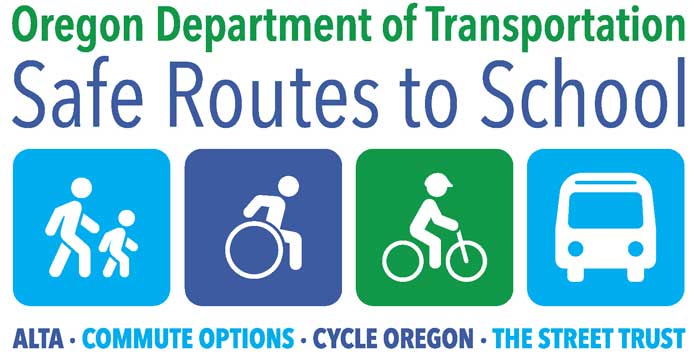ODOT Funding Opportunities
Active Grant Solicitations
Solicitation for Safe Routes to School Education, Construction, and Technical Assistance grants will be open for applications in spring 2026. Stay tuned for more information about the next round of solicitations.
Ongoing solicitations
- The Innovative Mobility Program (IMP) is a new initiative from ODOT that aims to improve access to public transportation, reduce the number of trips Oregonians make by car, and reduce greenhouse gas emissions. The IMP has a special focus on equity and helping historically excluded groups to get to where they need to go more quickly, cheaply, and safely. Learn more and apply today.
- Rapid Response Grants are for communities where a crash occurred in the last 24 months in which a pedestrian or bicyclist was injured, seriously injured, or killed (and the proposed project must specifically address the incident effectively and cost-effectively) or for communities where an urgent opportunity arises (meaning that something substantial and unexpected has changed and must be addressed before the next Competitive Grant cycle). Learn more and apply.
Inactive Solicitations
The Construction Technical Assistance and Education Grants are closed. Applicants will be notified by the Spring/Summer of 2024 if they have been awarded a grant.
Tier 1 Funding Pathway- Education Plus Grant- Beginner
- Bend La Pine Schools
- Centennial School District 28J
- Confederated Tribes of the Umatilla Indian Reservation (CTUIR)
- Harrisburg School District
- Bikeworks by Pear
- Community Cycling Center
- Hood River School District
- Mid-Willamette Valley Council of Governments
- North Wasco County School District
- Portland Public Schools
- Thrive Umpqua
- Beaverton School District
- City of Hillsboro
- City of Portland, Portland Bureau of Transportation (PBOT)
Click here to see the Education Grant recipients project information.
Construction Technical Services
For the 2024-2025 Safe Routes to School Construction (SRTS) Grant Solicitation, the following agencies were selected to receive additional technical services through the Project Identification Program. This program consists of three services: planning assistance, additional engineering assistance, and surface treatment projects. More information can be found here.
Planning Assistance Program
City of Coos Bay
City of Eugene
Harrisburg School District
City of Amity
City of Drain
Town of Bonanza
Hood River School District
City of Central Point
Burns Paiute Tribe (completion of process started in 2023)
Engineering Assistance Program
Klamath Falls: Old Fort Road/Laguna sidewalk & intersection improvements
Medford: Spring Street bikeway & sidewalk
Burns Paiute Tribe: Radar Base Road sidewalk
Days Creek: Tiller Trail Hwy pedestrian path
Hood River County (Parkdale School) pedestrian path & crossing
Surface Treatment Program
No Surface Treatment services were awarded in this cycle.
Construction Program Overview
$15 million in SRTS Construction funds are allocated annually to three programs:
Competitive Program: 87.5%
Rapid Response Program: 10%
Project Identification Program: 2.5%
More information on the ODOT SRTS Construction Program can be found here.
Competitive Construction Grant
For the 2025 Safe Routes to School (SRTS) Competitive Construction Grant Solicitation, the Oregon Transportation Commission approved 28 Safe Routes to School projects, with a total investment exceeding $31 million. These projects focus on making travel safer within a two-mile radius of schools, prioritizing under-resourced communities to ensure a safer journey for all students.
More information on the ODOT SRTS Construction Program can be found here.
Other Funding Opportunities
Metro Travel Options Grants
Regional Travel Options grants create safe, vibrant, and livable communities by supporting programs that increase walking, biking, ride sharing, telecommuting and public transit use. In 2019, Metro added a Safe Routes to School specific grant opportunity that provided $900,000 over 3 years to Safe Routes to School programs across the Portland Metro area. Learn more about the RTO grant program here.
In addition, Metro provides Regional Travel Options sponsorships – of which Safe Routes to School program support is eligible. Applications are accepted on a rolling basis. Learn more about RTO sponsorships here.
The Ford Family Foundation
The Ford Family Foundation provides grants for community building programs, especially in rural areas. You can learn more about their different grants, timelines, and application requirements here.
Kaiser-Permanente
Kaiser-Permanente provides grants to to help build healthy, safe communities. Read more about their eligibility requirements and grant opportunties here.
OEA Choice Trust Mini-Grants
The purpose of the Mini Grant Award is to support established School Employee Wellness programs with funding up to $5,000. Mini Grant funds are to be used to promote school employee health, well-being and resilience using the OEA Choice Trust Framework of Proven Strategies and Best Practices as a guide. Mini Grant Awards are meant to boost the current efforts of your program or help you develop and implement new parts of your program. Please click here.
People for Bikes
The People for Bikes Grant Program provides funding for bicycle infrastructure and targetted community bike advocacy. You can learn more about their grant program, timelines, and eligibility requirements here.
Robert Wood Johnson Foundation
The Robert Wood Johnson Foundation can provide grant funds to help expand and develop your SRTS programming. Learn more about their eligibility requirements here.
The State Physical Activity and Nutrition Program (SPAN)
The CDC announces the availability of fiscal year 2023 funds to implement CDC-RFA-DP23-2312: The State Physical Activity and Nutrition (SPAN) Program. Funding will support activities at the state and local governmental levels to implement evidence-based strategies and leverage resources from stakeholders and sectors (e.g., agriculture, transportation, education, business, commerce, and housing) in their populations of focus related to poor nutrition and physical inactivity. This NOFO will fund recipients to work with state and local partners to improve nutrition and access to safe physical activity, including breastfeeding, early care and education, and family healthy weight programs. No more than one applicant from a state will receive funding. Find more information here.
Racial and Ethnic Approaches to Community Health (REACH)
CDC announces the availability of fiscal year 2023 funds to implement CDC-RFA-DP23-2314: Racial and Ethnic Approaches to Community Health (REACH). This 5-year program is to improve health, prevent chronic diseases, and reduce health disparities among racial and ethnic populations with the highest risk, or burden, of chronic disease, specifically for African Americans/Blacks, Hispanic Americans, Asian Americans, Native Hawaiian/Other Pacific Islanders, American Indians, and Alaska Natives by:
Supporting culturally tailored interventions to address to promote activities to decrease tobacco use, poor nutrition practices, and physical inactivity. Supporting implementation, evaluation, and dissemination of practice- and evidence-based strategies of tobacco, nutrition, and physical activity collaborations that ultimately lead to reduced health disparities in chronic conditions of hypertension, heart disease, Type 2 diabetes, and obesity. Supporting activities to enhance capacity to educate and promote the importance of immunization among racial and ethnic minority populations. Linking community and clinical efforts to increase individual’s access to health care and preventive care programs within their community.
Funding will support recipients that:
Have a history of successfully working with an established community coalition to address issues relating to health or other disparities. Select strategies that address the health disparities in the community based on results from a community health needs assessment process. Have organizational capacity to effectively, efficiently, and immediately implement locally tailored evidence- and practice-based strategies.

